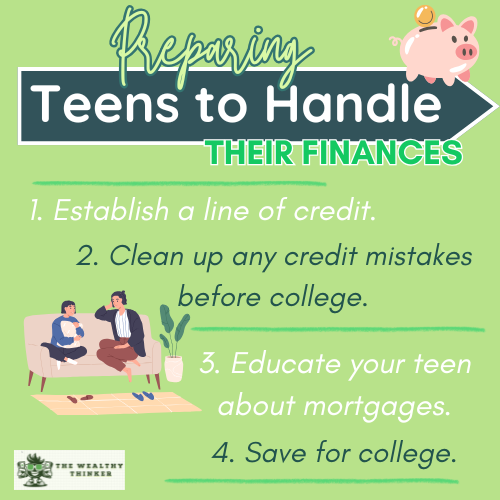It’s simple: if you prepare your teens about finances at an early age, it will give them a major leg up on handling their finances as adults.
While there are some things that are only available when they turn 18, there are plenty of lessons you can impart to your kids as they grow to adulthood. While they’re living at home, there are four ways to help prepare them to handle their finances:
- Establish a line of credit
- Clean up any credit mistakes before college
- Educate your teen about mortgages
- Save for college
These four areas can give your teen a head start in life and prepare them for the real world when they have an income, bills, and financial goals.

4 Ways You Can Prepare Your Teens to Handle Their Finances
1. Establish a line of credit.
As a parent, there are three easy ways to help your teen establish a line of credit:
- Add your teen to a loan or lease (They must be 18)
- Add your teen as an authorized user (Depending on your card, this could be done as early as 13, or earlier if they don’t have restrictions.)
- Teach your teen good credit habits
Establishing a line of credit for your teen early on is a great way to start them off on a financially positive future. Adding your teen to a lease or loan or even as an authorized user will give them a credit history.
As a parent, your job is to ensure that you are making on-time payments to any line your teen is added to. Teach your teen these good habits so that they will be a financially responsible adult when it comes to their credit score.
Without your help, your teen will enter adulthood with no credit history and no score. Starting early will help them build a credit history, so when they are ready to get their own credit card or take out a loan, they will have a good score for the best interest rates.
2. Clean up any credit mistakes before college.
Having a perfect credit score is hard, but it’s easy to have a good or excellent score over a poor score. The difference between poor and good can mean saving thousands in interest payments. So it pays for your teen to have the best credit score that they can.
Check their credit score to ensure they were not victims of identity theft or have any unknown accounts on their record. If your teen’s credit score is low and there are errors, getting sets of fraudulent claims removed will help improve their score.
Before they enter college, anything on their credit record that can be removed will help them secure any job, utilities, or credit they may need.
If your teen’s score is low because they were on your account and missed a payment, you may have to work on your credit to fix theirs.
Any accounts you’re late on or have a high balance on should very quickly bring up a credit score if taken care of. Work on making on-time payments and pay off large sums as you can to help your teen’s score.
3. Educate your teen about mortgages.
It may seem early to talk to your high schooler about mortgages, but explaining the process to them at a young age can allow them to potentially invest in real estate at any age.
In addition, teaching your teen the entire process of securing a mortgage for their first home will allow them to avoid many common mistakes that can happen to first-time home buyers.
Applying for a mortgage takes more time than applying for a credit card. Before you even look for a home, you need to be pre-approved for a mortgage. A mortgage broker will give you a certain amount you can borrow for a home.
They will assess this number with bank statements from all savings and checking accounts as well as your full credit report.
If your teen understands all of the information needed, they will keep better records and a good credit score to secure enough of a mortgage for their dream home. Without the best documentation, your child could be approved for a smaller mortgage.
4. Save for college.
The cost of college is at a record high. For many students, taking out student loans is the only way that they can pay for it. Student loans can be crippling for a young adult entering the workforce. As a parent, you can help your teen secure funds for higher education without taking any further debt like:
- Scholarships/Grants
- 529 Savings Plan
- Part-Time Jobs
One of the best places to avoid student loans is to find scholarships or grants to cover the partial cost of your child’s education. However, scholarships may not cover the full amount, so someone will have to save money for them to go to college without taking on a student loan.
As a parent, you can start a 529 savings plan. This is a specialized savings account specifically used for education costs for your child. Alongside your savings, if your student is able to work a part-time job in the summer and save that money for college, they can also contribute to their education.
Prepare Your Teens to Handle Their Finances
Helping your teen with their finances before they go to college will give them a financial head start.
Certain aspects of personal finance improve with time, like a credit score. Different areas of personal finance include good financial habits like saving and investing.
Editor’s note: This article was originally published Mar 20, 2023 and has been updated for economic changes.



















Great text
Thanks!